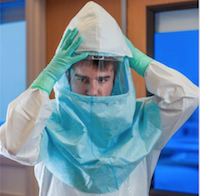Emory Team to Train First Responders in Infectious Disease Protection
Emory University School of Medicine's Department of Emergency Medicine has received a $375,000 grant to help train first responders, and workers whose jobs may expose them to infectious diseases, in ways to protect themselves and prevent the spread of disease.

The Emory University School of Medicine's Department of Emergency Medicine has received a $375,000 grant to help train first responders, and workers whose jobs may expose them to infectious diseases, in ways to protect themselves and prevent the spread of disease.
This grant represents the first year of a 3-year, $9 million program being launched by the National Institute of Environmental Health Sciences (NIEHS), a division of the National Institutes of Health (NIH), in collaboration with the Centers for Disease Control and Prevention (CDC) and other federal agencies. Emory is one of 8 organizations to receive funding through the new Ebola Biosafety and Infectious Disease Response Training program.
"First responders in emergency medical services, in frontline health care facilities and in public health practice, are at risk for exposure to serious communicable pathogens," says Alexander Isakov, MD, MPH, associate professor in Emory's Department of Emergency Medicine. Isakov will lead the interdisciplinary team from Emory's schools of medicine, nursing and public health, its Office of Critical Event Preparedness and Response, Emory's Serious Communicable Diseases Unit and Grady's Emergency Medical Services in delivering the training program regionally and nationally.
"We are thrilled to be part of a program that will train those on the frontlines at risk for exposure", says Kate Moore, associate professor at Emory's Nell Hodgson Woodruff School of Nursing. Kathy Miner, associate dean at Emory's Rollins School of Public Health adds, "As the director of an HRSA-funded Public Health Training Center, I am looking forward to joining Dr. Isakov and his team in developing and delivering high quality infectious disease education."
The need for curriculum development and training was identified during a 2014 Institute of Medicine workshop about Ebola virus. In addition to NIH and CDC, other federal partners include the US Department of Health and Human Services Office of the Assistant Secretary for Preparedness and Response and the Occupational Safety and Health Administration.
"Ensuring training and competency of workers in a variety of settings is a critical safety net in preparing for emerging infectious disease threats," says Beth Bell, MD, director of the CDC's National Center for Emerging and Zoonotic Infectious Diseases. "We are pleased to be partnering with NIH and their grantees to fill this training need."
The new Ebola Biosafety and Infectious Disease Response Training program will benefit health care workers as well as personnel in waste management, transportation, mortuaries and other occupations with the potential for infectious disease exposure. The environmental infection control practices and hazard recognition skills will be applicable to any high-risk infectious disease that can be easily transmitted person to person.
"Environmental infection control and hazard recognition training is a critical part of the risk mitigation and prevention strategy required to protect frontline workers and prevent the spread of these deadly diseases," says Isakov.
In addition to Emory, grants will go to seven organizations that have the capacity to provide geographically distributed training for a range of occupations:
- Duke University, Durham, North Carolina
- Indiana University, Bloomington
- International Chemical Workers Union Council, Cincinnati, Ohio
- Laborers' International Union of North America Education and Training Fund,
- Pomfret Center, Connecticut.
- Rutgers School of Public Health, Piscataway, New Jersey
- Steelworkers Charitable and Educational Organization, Pittsburgh, Pennsylvania
- University of Alabama at Birmingham.